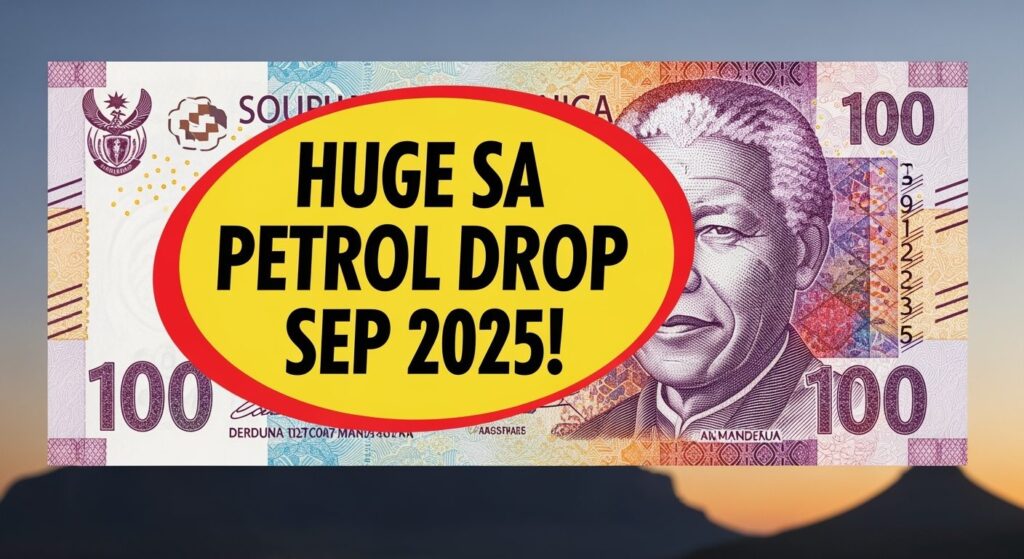Petrol price drop: I’m thrilled to share some fantastic news that will bring relief to South African motorists next month. The Department of Energy has officially confirmed a significant petrol price drop for September 2025, which will ease the financial burden on millions of drivers across the country. This welcome announcement comes after months of steadily increasing fuel costs that have strained household budgets and business operations alike. Have you been feeling the pinch at the pump lately? Well, get ready for some much-needed savings when you fill up your tank next month.

What Causes the September Petrol Price Drop?
The upcoming petrol price drop can be attributed to several key factors working in South Africa’s favor. International oil prices have seen a substantial decline over the past few weeks, primarily due to increased production from major oil-producing nations and lower global demand. Additionally, the rand has shown remarkable strength against the US dollar, further contributing to the reduced import costs for fuel. The Department of Energy’s monthly review takes these international and domestic factors into account when calculating fuel price adjustments. The combination of these positive economic indicators has created the perfect conditions for this significant petrol price drop that will benefit all South African drivers.
Why This Price Reduction Matters
This petrol price drop represents more than just savings at the pump—it has far-reaching implications for our economy. When fuel costs decrease, transportation expenses follow suit, potentially leading to lower prices for consumer goods across the board. For the average South African household, this means more disposable income that can be directed toward other essential expenses or even savings. Businesses, particularly those in logistics and transportation sectors, will see reduced operational costs, which could translate to more competitive pricing or improved profit margins. The timing couldn’t be better as we approach the holiday season, when many families plan long-distance travel to visit loved ones.
How Much Will You Save?
The Department of Energy has confirmed that the petrol price drop will be substantial enough to make a noticeable difference in your monthly budget. According to their announcement, 93 octane petrol will decrease by R2.15 per liter, while 95 octane will see a reduction of R2.30 per liter. Diesel users haven’t been left out, with prices set to drop by R1.85 to R2.00 per liter, depending on the grade. For the average motorist with a 50-liter tank, this translates to savings of over R100 per fill-up. If you typically refuel your vehicle once a week, you could be looking at monthly savings of approximately R400-R450. Isn’t it refreshing to see these kinds of numbers working in our favor for once?
- 93 Octane: R2.15 per liter reduction
- 95 Octane: R2.30 per liter reduction
- Diesel 0.05%: R1.85 per liter reduction
- Diesel 0.005%: R2.00 per liter reduction
When Will the New Prices Take Effect?
The petrol price drop will officially take effect at midnight on Tuesday, September 2, 2025. This means that from Wednesday morning, all petrol stations across South Africa will implement the new, lower prices. The Department of Energy has already notified all fuel retailers to prepare for the adjustment, ensuring a smooth transition. It’s worth noting that fuel prices in South Africa are adjusted on the first Wednesday of each month, based on the previous month’s average international oil prices and exchange rates. While this September decrease is confirmed, future adjustments will depend on ongoing global and local economic factors, so I recommend taking advantage of these savings while they last.
Real Impact on South African Drivers
I spoke with Thabo Mkhize, a taxi operator from Johannesburg, who explained how the petrol price drop will affect his business: “This is huge for us in the taxi industry. Fuel is our biggest expense, and with this petrol price drop, I’ll save almost R3,000 per month across my fleet. This means I can finally catch up on maintenance I’ve been postponing and maybe even reduce fares for my regular passengers who have been struggling with the high costs of commuting.” Thabo’s experience highlights how these savings will ripple through various sectors of our economy, potentially benefiting not just drivers but passengers and consumers as well.





